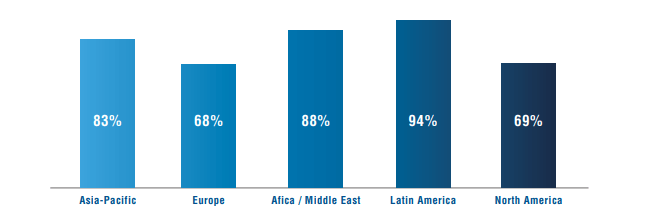How can you choose a trustworthy source of DHA ?
Sustainability: what legacy will we leave to future generations ?
What is sustainable food ?
The idea of sustainability is not new, but nevertheless remains complex.
According to the UN FAO definition, sustainable food is healthy, balanced and nutritionally adapted, and at the same time is produced in a manner that protects biodiversity and ecosystems. It must also preserve cultural diversity and optimize the use of natural and human resources (UN FAO, 2010).
According to an IPSOS survey in 2016, 83% of respondents said they did not have enough information on the social impact of products, and 78% said the same regarding impacts on the environment and health. This shows that consumers are seeking affordable and naturally healthy products. They are also keen to find committed brands that provide ethical and sustainability.
A naturally healthy diet
Sustainability and naturalness often go hand in hand. Consumers are looking for products that naturally contain health-giving nutrients. Today, they know the difference between “fortified” foods and “naturally rich in” foods. A market study conducted by FMCG Gurus in 2020 looked at consumer nutrition and the related major trends. Some of them relate directly to omega-3 consumption: consumers now know that their diet has a direct impact on their long-term health, so they are trying to change their eating habits to improve their general wellbeing. We are seeing the emergence of a proactive approach to health, including research into functional and chemical-free products.
The benefits of omega-3 are now widely recognized and scientifically-proven (by over 4,000 studies). These relate to cognitive health, ophthalmic (AMD, dry eye) and cardiovascular health; from pre and post-natal right through to old age. In addition, scientific research is now focusing on their role in immunity, microbiota and neurodegenerative conditions such as Alzheimer’s disease.
Omega-3 and health claims
The European Commission has also defined a number of health claims for EPA and DHA. Scientifically recognized and proven, docosahexaenoic acid (DHA) claims relate to cognitive function, cardiovascular health, and vision*:
DHA contributes:
- to maintenance to normal brain function
- to the maintenance of normal vision
- to the maintenance of normal blood triglyceride levels
DHA maternal intake contributes:
- to the normal development of the eye of the fetus and breastfed infants
- to the normal brain development of the fetus and breastfed infants.
DHA intakes contributes to the normal visual development of infants up to 12 months of age.
DHA and EPA contribute:
- to the maintenance of normal blood pressure
- to the maintenance of normal blood triglyceride levels
- to the normal function of heart
*these claims are valid for specific dosages.
Omega-3s, such as DHA, are part of an approach to preventive healthcare and optimization of our health capital with a view to healthy growth and healthy aging. This is why they are flagship ingredients in natural health products including nutraceuticals, dietary supplements and functional foods.
However, when consumers are asked about the role of omega-3s in their health, they are not always sure how to answer (46% of respondents, FMCG Gurus). Often, they don’t know how much omega-3 they have ingested in the previous 24 hours (24% of respondents know theamount, FMCG Gurus). In addition, the benefits of omega-3 are only perceptible over the long term when taken in the interests of preventive healthcare. It is therefore important for manufacturers to educate consumers about omega-3s.
Consumers want to see more information on product packaging and in advertisements. Technology in particular could facilitate the task of communication on product traceability through information on websites, QR codes, health mobile applications, etc.
A real challenge for society
A new breed of responsible consumer, one who is socially, politically and environmentally committed and informed, does not want their current health to be at the expense of their future health or the health of their ecosystem.
Consumers are concerned about product supply chain and also producer quality of life and remuneration: 84% prefer companies that employ local producers (12th Greenflex 2017 barometer).
The ecosystem also includes an increasingly significant environmental dimension and sustainability. For example, we might ask ourselves about the impact of intensive fishing and catching fish intended for the production of omega-3 oils that will then be included in food supplements. The societal challenge of sustainable food requires rethinking the global impact of food on the environment. It has been said that when we buy a product, we are also buying the world that goes with it.
Consumers therefore ask more questions about the origin of products and how they are produced. Is it sustainable? Have natural resources been plundered? What are the healthy and environmentally-friendly alternatives?
Food produced with a commitment to protecting biodiversity
A brand’s commitment to the environment appeals to consumers and is a decisive factor when it comes to purchasing.
The graph below shows the percentage of respondents who say it is extremely or very important that companies implement environmental improvement programs (The Conference Board® Global Consumer Confidence Survey, conducted in collaboration with Nielsen Q2 2017).
Today’s consumers know that the food they eat has an impact on the environment. In producing, processing or storing our food,we exploit natural resources and generate pollution. We are seeing a real awakening of consumer consciousness and a demand for manufacturer transparency.
To regain their trust in companies, consumers are expressing various high expectations of this transparency in the way products are manufactured. Even though pollution is still a concern, biodiversity is an issue that is gaining momentum, particularly in terms of animal and plant species becoming extinct.
Ethically-sourced omega-3 dietary supplements are more environmentally-friendly and meet consumer expectations in terms of sustainability.
According to FMCG Gurus, 3 out of 10 consumers want more sustainable products, particularly products derived from fish. The “good for me, good for the planet” concept is increasingly in evidence. Ocean pollution is consumers’ biggest concern, slightly ahead of overfishing.
Microalgae-derived omega-3s address these deeply-held concerns, giving added value to the products of manufacturers and brands that use this plant-based, sustainable source of omega-3.
Consumers are willing to pay more for sustainable products from committed brands
One thing’s for sure: consuming higher quality products is more expensive. However, according to Nielsen’s latest Global Corporate Sustainability report in 2015, 66% of people across the world are willing to spend more on quality food.
Despite changes in an unstable economic climate, 70% of millennials aged 20-35 are willing to pay more for sustainable products (Nielsen Global Corporate Sustainability 2015). We can see that millennials are expecting firm commitments from industry and governments on the legacy that will be left to them. This is a strong signal for brands that must commit to sustainability to maintain the trust of consumers, now and in the future.
According to FMCG Gurus, 3 out of 10 consumers want more sustainable products, particularly products derived from fish. The “good for me, good for the planet” concept is increasingly in evidence. Ocean pollution is consumers’ biggest concern, slightly ahead of overfishing. They’re looking for sustainability.
Microalgae-derived omega-3s address these deeply-held concerns, giving added value to the products of manufacturers and brands that use this plant-based, sustainable source of omega-3.







